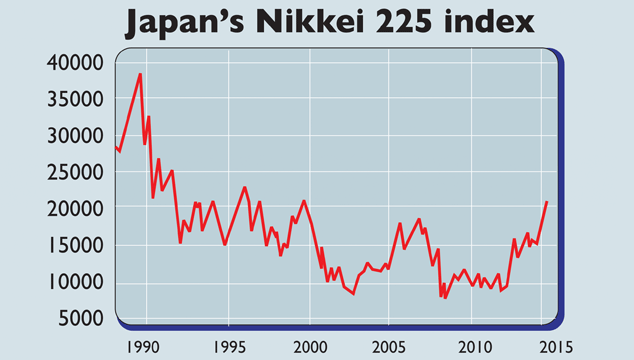
Onwards and upwards for Japan’s stockmarket. The Nikkei 225 index has jumped by around a third in the past six months, and is now at a 15-year high. Meanwhile, the large-cap “First Section” of the Tokyo Stock Exchange has eclipsed the total market capitalisation first reached at the height of the bubble in 1989: ¥590trn.
These days, however, there are 720 more companies listed than 26 years ago, a good indication that the index is not in bubble territory. Indeed, valuations are still very reasonable, with 40% of stocks trading below book value.
There are other reasons to be bullish. The main one is that liquidity always buoys asset markets, and the Bank of Japan’s money-printing programme, designed to lift inflation to 2% and end years of stagnation and falling prices, is set to continue.
Indeed, the Bank of Japan has made clear that it could increase its monthly asset purchases if it is struggling to hit the target. It may well do so, as recent data have been mixed: the economy grew at an annualised rate of 2.5% in the first quarter, but inflation is just 0.6%.
Structural changes are another reason to stick with Japan. New corporate stewardship and governance codes “have introduced a Western understanding of best practice for shareholders and management teams”, says Brewin Dolphin’s Michael Paul.
The government is encouraging firms to become more shareholder-friendly by taking on board investors’ views and deploying their cash piles. For now, that means higher dividends and buy backs; longer term, it should mean that “Japan can reach a new level of profitability”, says Sarah Williams of Columbia Threadneedle Investments.
Meanwhile, the Government Pension Investment Fund – which is switching from bonds to equities at the behest of the government – is being encouraged to focus on companies with sound governance.
The fund has been told to track the JPX-Nikkei 400 index, which contains shareholder-friendly firms, rather than the Topix or the Nikkei. The authorities hope that “companies that don’t make the grade… improve their practices and win the confidence of international investors”, says David Budworth in The Times.
Retail investors are also being encouraged to buy stocks. They hold over half of their assets in cash, so there is plenty of scope for them to buoy the market. Hence the Japanese rally has further to go.